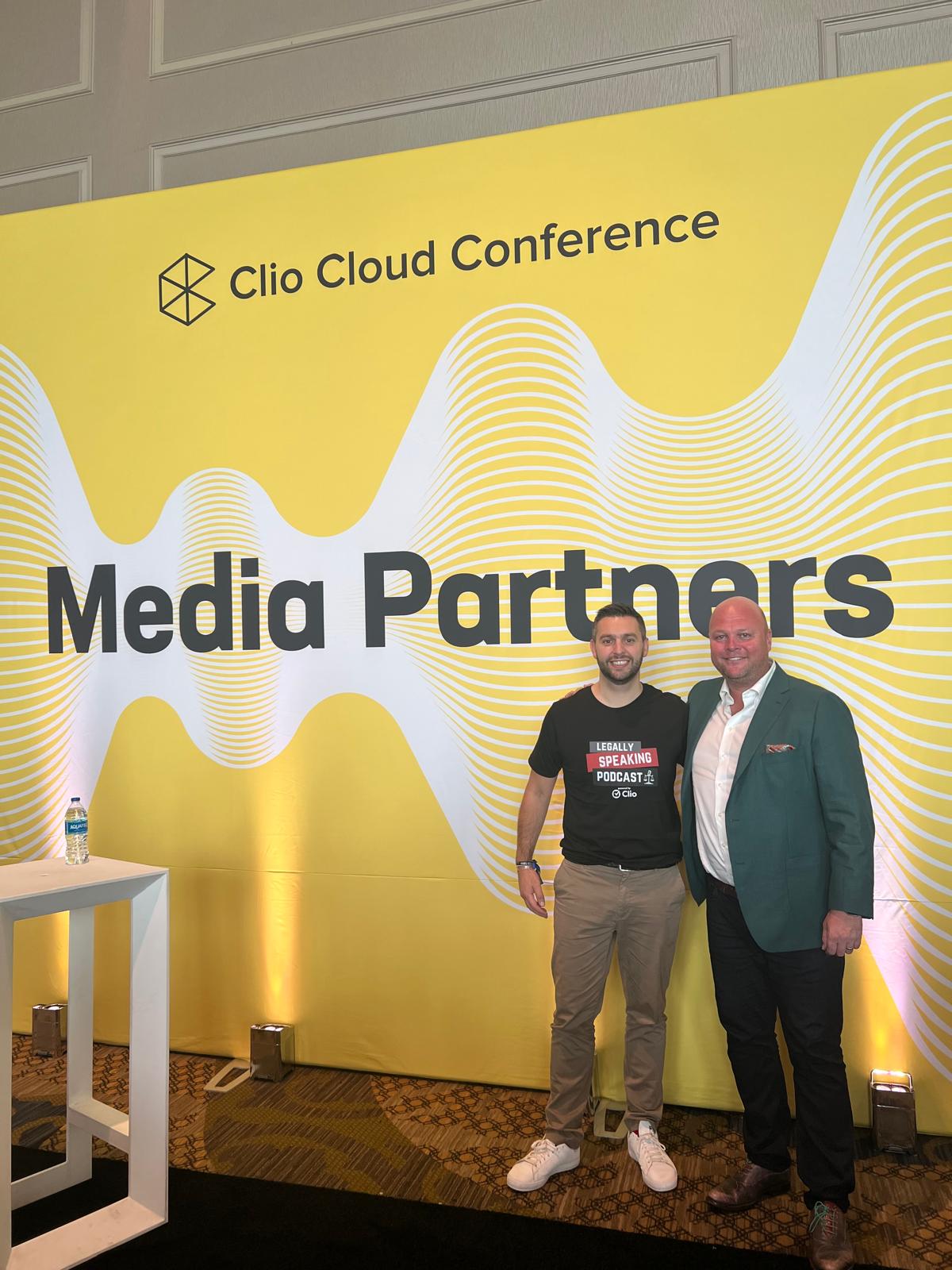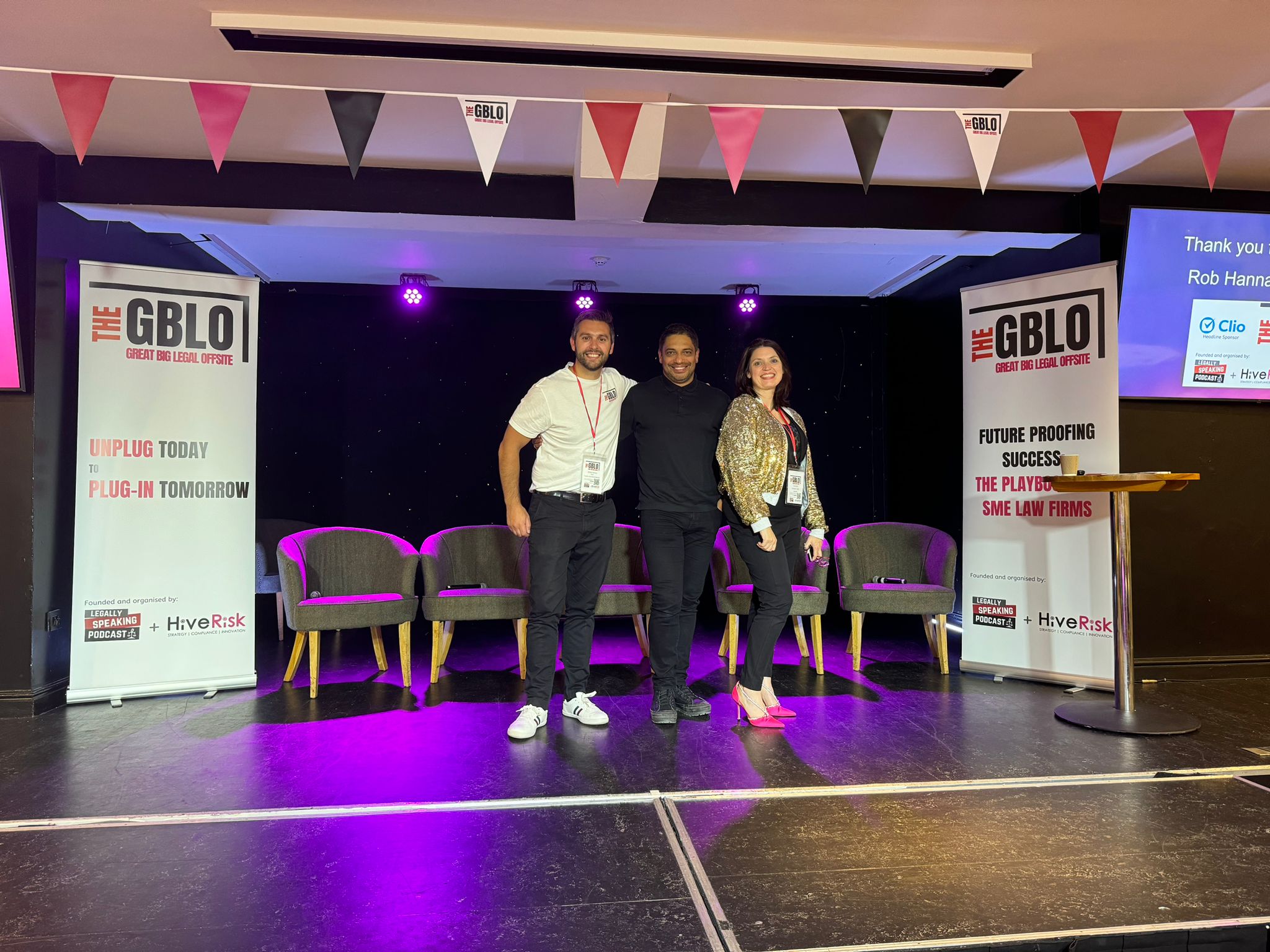
Our Host has joined the Advisory Board of Caseguru!
Congratulations to Our Host, Robert Hanna, on joining the Advisory Board of Caseguru!🌟 Finding a lawyer

The ‘Fertility in the Workplace’ Miniseries, featuring Natalie Sutherland and Somaya Ouazzani, delves into how fertility in the workplace can be addressed more openly and how law firms can do a better job at acknowledging the challenges faced around fertility. The series looks into tackling fertility issues as a lawyer, in addition to family planning and becoming parents.
Natalie Sutherland is a Partner at Burgess Mee, a Family Law Firm and their first fertility officer. Natalie has experience handling surrogacy matters, based in the UK and internationally.
Somaya Ouazzani is the CEO and Founder of Mimoza Fleur, a boutique executive search firm, in the legal sector. Somaya was previously a family and divorce lawyer, at Kingsley Napley, and Russell-Cooke LLP.
In the forth minisode of the series, Rob, Natalie and Somaya discuss why lawyers leave firms when thinking about starting a family or after becoming parents… Should lawyers be prioritising either family planning or their career?
00:06 Robert Hanna:
Welcome to the Legally Speaking Podcast. I’m your host Rob Hanna. I’m delighted to bring you all the Fertility in the Workplace miniseries featuring Natalie Sutherland and Somaya Ouazzani. Natalie is a partner at Burgess Mee, a family law firm and their first fertility officer. Natalie has experience handling surrogacy matters based in the UK and internationally. She deals with surrogacy, assisted reproduction law and donor conception. Natalie advises clients on co-parenting as well as known donor agreements. Recently, she’s joined the Board of Trustees of Progress Educational Trust, a charity advancing public understanding about human genetics, embryology and stem cell research. Somaya is the CEO and Founder of Mimoza Fleur, a boutique executive search firm in the legal sector. Somaya was previously a family and divorce lawyer at Kingsley Napley and Russell-Cooke LLP. Somaya also worked as a Senior Consultant specializing in legal recruitment with Magic Circle and US law firms. Whilst working with senior female lawyers, Somaya gained a unique perspective on how professional women view family planning. Also, how law firms are beginning to enhance their health packages to include fertility treatments. The miniseries will delve into how fertility in the workplace can be addressed more openly, and how law firms can do a better job at acknowledging the challenges based around fertility. The series looks into tackling fertility issues as a lawyer, in addition to family planning and becoming parents. In our last minisode, we will be discussing recruitment and retention on what lawyers or aspiring lawyers should consider when thinking about their conception journey or starting a family. We’ll also look at career planning and things to consider when moving jobs at the same time as well as beginning a family. So Natalie, Somaya, welcome back. Natalie starting with you, why do lawyers leave firms when thinking about starting a family, or after becoming parents.
02:13 Natalie Sutherland:
Actually becoming a parent for the first time is life changing, as I’m sure Rob, you know, recently becoming a father. So it can, it can create all sorts of different feelings. I, when I went back to work after having my daughter, I had to get back after 12 weeks. And that was hideous, to be honest. I wasn’t ready, but I didn’t really have a choice at the time. So you’re battling with guilt about going back to work. You’re battling with guilt if you don’t go back to work. So, so yeah. So, if you’re if you then leave a firm, usually, it is because you want something better. So you want to be able to manage your now, your career with being a parent. So, I can imagine people moving firms for a work life balance, or potentially joining a firm if they have these fertility benefits that, that you might not have at your current firm. Somaya touched on it before in an earlier episode about it being about retention. So being able to attract talent. If you’re a firm that, that, that offers that. So there’s lots of reasons why you would move to a firm if you were having fertility problems, and they had fertility benefits, and you didn’t at your current firm.
03:33 Robert Hanna:
Yeah, no, great, great, great points, as always, Natalie. And Somaya, I want to come to you, you know, what should lawyers have in mind if they’re thinking of changing firms during this crucial time?
03:47 Somaya Ouazzani:
I think they really got to have a very good understanding of what are their expectations? What are they wanting to get out of their move? You know, I think if, if a move is just a knee jerk reaction to returning from maternity leave, for example, and then not quite understanding or trusting themselves to be able to balance their existing job with their new life as a new parent, that doesn’t always make the best foundation for a move. Equally, if you’ve got an individual who is in the throws of a very challenging fertility journey and they just feel that the environment they are in, is just too high stress, too high pressure, the billables are unattainable, the hours are too long, the environment’s too toxic, and we all know those sorts of firms and sectors. And therefore they think well actually, if I dropped down a couple of rankings, and I moved to a slightly different type of firm, take a bit of a pay cut, does that give me a little bit more latitude to be able to pursue my family objectives? Again, that can work, but I think one also has to keep in mind the extent to which that can sometimes bring resentment. If you are throwing absolutely everything including the kitchen sink at your fertility journey and you then take a pay cut, and then, you then take a drop in the firm that you are at, and then you feel that actually, your professional life is suffering too, you’re not necessarily coming to your fertility journey in the best way. You are coming to it with further, you know, frustration, impatience, resentment, as I say. So I think you have to really make sure that you partner yourself with somebody that knows your market incredibly well, that can be your trusted advisor, that understands what you’re wanting to achieve from a move. And actually, if the move is the right thing, you know, Natalie mentions, quite rightly, the, the benefits of moving to a law firm, which can give you some sort of tangible fertility support, whether that be you know, a financial resource or such other, such a thing, and that, that’s all well and good. But that’s not always immediately available to people, once they arrive. There’s usually a minimum level of service that one has to complete before being, you know, able to access those benefits. So, I guess what I’m saying Rob is, you have to have some very good considered reasons about why you’re moving. And then when you do decide to make that move, you must know what your quantifiables are. You have to know what your value is, you have to know what you’re bringing to the party, you have to have complete trust and confidence in yourself to be able to say to anywhere new, I’m moving and speaking very candidly, I’m moving for these reasons. But that doesn’t mean I’m not absolutely committed to this opportunity. That doesn’t mean that I can’t bring to your firm and your team, the specific expertise, I can deliver this client base, I can offer this by way of addition to your revenue. You know, it’s all of those things. I think, if you feel like you’re walking on eggshells, when having those conversations, you’re jumping out the fire into the frying pan.
06:41 Robert Hanna:
Yeah, really sage advice there Somaya, I couldn’t agree more. And, you know, Natalie, just to build on Somaya’s points there, you know, what should lawyers be thinking about at their existing firm before, during, and after their conception journey?
06:58 Natalie Sutherland:
I think having this conversation, realizing what you want to do in terms of opening up about, how much you want to open up, as I’ve said, previously, you know, it is a personal, personal journey. And you there are people that are going to be much more open about it than others. But understanding what your firm does offer. So, so do they have a fertility officer? Do they have HR assistants, where you can some firms do things like have lunch and learn, where they give training on, on the fertility issues in the workplace, so that all staff are better educated about what is happening. Because even if you are, you’re working in a firm, and you don’t want, you don’t want a family, or you’ve had it easy to have a family, you might have a colleague who is going through it and, and having that support with and around you, of your colleagues at your level and above, is invaluable, really. So, so reach out if you, if you need the help. And of course, we have to recognize that we need the help and have to be accepting of that help. And as women, that’s often difficult. But, but this is why we’ve talked about having this open culture so that people know that if they are having these issues that they can confide in the relevant people or not as, as, as they want to say that they’re feeling supported during their journey.
08:30 Robert Hanna:
Yeah, really good point. And, you know, making them feel supported is so important, and not just maybe another number or, you know, an isolated case. So I’m really appreciate you highlighting that. And coming to you, then Somaya, should lawyers be thinking about family planning early on in their careers?
08:49 Somaya Ouazzani:
And I don’t think that there’s ever specifically a time when somebody, I don’t, I don’t think it’s as contrived as that, I think it tends to be much more of an organic thought process. But what I would absolutely want to stress is that you should never be delaying your family planning for your career. I don’t think that’s the right thing to do. And I think that however, or whenever you choose to start your family planning journey, there are lots of things that if you’re clever and strategic about it, you can, you know, I don’t want to use the cliche of you can have it all, but you absolutely can get to as close as that, as possible if you’re in the right environment. So it’s things like, being mindful of how work is being allocated to you whilst you’re pregnant. And are you seeing a change in the quality of the work that’s being allocated to you? Is that because actually your supervisor is wanting to be very supportive and make, making sure you’re not getting, you know, overburdened with work, that’s going to mean you’re doing a 15 hour day and actually preparing you for your maternity leave, or are they working on some very lazy assumptions that actually you want to get, you know, you’re going to want to come back three days a week and you’re just not going to have the inclination, the ability, the latitude to throw yourself at your work as you were doing pre-pregnancy, pre-mat leave. I think what you also want to think about is if, if a promotion is very important to you, at what stage should you be pushing for that, there is absolutely no reason why you can’t and shouldn’t be pushing for that whilst pregnant. And even on maternity leave, actually, I’ve seen some fantastic promotions at some brilliant firms in this city, whilst people are on their first, second, third maternity leave. I think you’ve also got to be thinking very carefully about if you are looking to move upon returning from that leave. Again, there are a number of things that you, you can do. And if you’re partnering yourself with, you know, with a trusted agent that knows your market incredibly well, then conversations need to be had around things like, is there a financial penalty, that you are going to have to pay your existing firm if you don’t return from that leave. And if there is, then get your agent to have a very candid conversation with the new firm that you’re talking to about effectively reimbursing you for that. You know, if you are going to be bringing something to them, that they want to need and don’t have, that they’ll, they’ll, they’ll dig deep, they’ll put their hands in their pockets. So, it’s all of these sorts of considerations that can mean there’s never a wrong time to have to have a child or thinking about having a child. It’s just about how strategized and organized you are in your approach to it.
11:25 Robert Hanna:
Yeah, and again, fabulous points, thank you so much for, for sharing that. And you know, that really will hopefully help lots of people listening in. I just want to sort of jump back to you, Natalie is an extension of that, where we’re talking about family planning early on in careers, you know, is any stage too soon? And if not, you know, what should they be thinking and planning for professionally?
11:45 Natalie Sutherland:
Well, there’s, I was told, and I’m sure Somaya has heard this from other people is, don’t have a child until you’ve made partner. So you there is a lot of pressure on you to have achieved certain seniority before, it is acceptable to have, go off and have a child. But, but that’s not like I would I think that as Somaya said, you know, you shouldn’t be putting off your family building for your career, for that, for just for that reason. Because you’ve got no idea how, how you’re going to go along that road, infertility, secondary infertility, you don’t know that that is going to impact you until you start trying. And if you, if you put it off until later in your career, then going to be potentially more difficult. And we we’ve statistics, right recently that most women now are over 30 having, having children than they were before. So, so we are seeing women starting their fertility journey later. But again, having that culture that, where firms acknowledge, absolutely, that your career and your family planning go side by side. Should we hope give people the confidence then to be able to relax and start their family journeys, when they want to, without having this added pressure of having to put it off for any perceived reasons. Because, you know, you want to do it at your own pace, and being supported in the workplace helps that I think.
13:24 Robert Hanna:
Yeah, absolutely. And you touched on, you know, firms, they’re, you know, sticking with you, Natalie, what are you seeing market leading firms, do given the widely accepted fertility struggles, many established female professionals experience?
13:39 Natalie Sutherland:
Well, we are seeing the bigger firms giving, providing these fertility benefits. It’s coming across from America, I think. We’re seeing that a lot in all the big tech firms. We are now seeing it in the big law firms. It might trickle down to the, the smaller firms, but and then fertility policies as well. So we’ve talked about those, they are becoming much more widespread now. I hope that a lot, a lot more firms will pick up on those because the government, you know, they don’t allow time off for things like IVF appointments. It’s not like an employee, an employee benefits by statute. So you’re looking at your own employer for that assistance. And if you are putting that in a policy, then you are signaling to your staff that you acknowledge that this might be something you need, and we want to give it to you. So, so we are seeing that more in law firms, and it’s a really good thing.
14:44 Robert Hanna:
Yeah, absolutely. Absolutely a great thing. And so finally, Somaya, what can, can’t you negotiate when it comes to fertility and career planning? For example, you know, mirror maternity leave, sign-ons to support fertility treatment or to help women repay maternity leave penalties to the firm, their parting, you know what can be done?
15:05 Somaya Ouazzani:
Absolutely anything can be done. It just depends on the boldness with which your agent is prepared to negotiate these things on your behalf. You know, when I first started out doing this six, seven years ago, I would have thought twice about actually having some of these conversations. And now for me, it’s an absolute given. So, I have negotiated individuals to have maternity leave mirrored well before their 12 months. So I had a candidate over the summer of last year, that was probably one of the very best at what she does in her field. She knew that my firm, my client knew that, she was in the throws of IVF. And we were hoping that actually upon her starting the new role she’d be pregnant. So as part of her offer, not only did they agree to pay the maternity leave penalty that she was going to have to pay her firm, but they also agreed to match exactly the same maternity provisions that her firm we’re going to give her. Now, interestingly, that made for some quite interesting discussion around you know, would that mean that she’s getting better maternity benefits and the people that are at the firm, she’s moving to etc, etc. But it’s all possible, you know, you’ve just got to be prepared to have the conversation. And you’ve just got to know what your value is. It’s all about making your, your candidate visible. It’s all about know what their elevator pitch is. And once they know what their elevator pitches, they’ll have that, that candor to say, you know, I’m not leaving unless you offer me this.
16:32 Robert Hanna:
Yeah, fantastic points, Somaya. And that brings to the end our miniseries on fertility in the workplace. We’ve covered everything from understanding why this is a real issue in the first place, to recommending how law firms can do better, advice for career planning and how fertility at work coaching can make a real difference. That just leads me to say, Natalie and Somaya, thank you so much for joining me throughout this miniseries. I thoroughly enjoyed it. If people want to get in touch and get involved about future events, what’s the best way for them to do that, coming to you first, Natalie.
17:10 Natalie Sutherland:
So they’re just me.com is our website. I’m on Instagram, as at the modern family lawyer and also on LinkedIn.
17:14 Robert Hanna:
Fabulous. And Somaya, where can people find you? And please do tell us more about your events.
17:19 Somaya Ouazzani:
So my LinkedIn handle is Somaya Ouazzani and my firm’s called Mimoza Fleur. We are in the process of organizing a number of other future events. Our infertility in the city event last December, was a huge success. And we’ve had so much interest in people wanting us to host a second, third, fourth. So all of that is in the making at the moment. As far as Natalie and I know, this conversation, the infertility in the city discourse is the first of its kind in the city. It’s certainly on this sort of public scale. It’s never been done before. And we’re incredibly proud to be breaking those boundaries, and really sort of pushing those frontiers. And this is just the very start, Rob.
17:59 Robert Hanna:
Absolutely. And you have our full support from all of us on the Legally Speaking Podcast. So thanks so much. Once again, Natalie and Somaya. It’s been an absolute ball having you on and you’ve shared so many insights that can help so many people but for now, from all of us on the Legally Speaking Podcast over and out.
18:26 Robert Hanna:
This week’s review comes from James Moulton five stars. Robert and the team were absolutely amazing to work with and really professional can’t wait to work with them all together again soon. Thank you so much for your very kind words, James. It was an absolute pleasure working with you to and from all of us on the Legally Speaking Podcast. We appreciate you.
You may also tune in on Google Podcasts, Apple Podcasts, Spotify, or wherever you get your podcasts!
Give us a follow on X, Instagram, LinkedIn, TikTok and Youtube.
Finally, support us with BuyMeACoffee.
🎙 Don’t forget to join our Legally Speaking Club Community where we connect with like-minded people, share resources, and continue the conversation from this episode.
Sponsored by Clio – the #1 legal software for clients, cases, billing and more!
💻 www.legallyspeakingpodcast.com
📧 info@legallyspeakingpodcast.com
Disclaimer: All episodes are recorded at certain moments in time and reflect those moments only.

Congratulations to Our Host, Robert Hanna, on joining the Advisory Board of Caseguru!🌟 Finding a lawyer

Congratulations to Our Sponsor, Clio, on announcing their Series F funding value, that values Clio at

Join us as we take a deep dive into the technical revolution happening in the Irish
Average Range of Salaries *These are paid at the £/$ exchange rate and so are prone

Event Overview:In 2024, the Legally Speaking Podcast and HiveRisk founded a unique law firm leadership strategy
I’m thrilled to share the highlights from our exclusive “LegalTechTalk Uncovered” miniseries. Join me as I

*DISCLAIMER* All episodes are recorded at certain moments in time and reflect those moments only. The podcast does not support or associate itself with any inappropriate behaviour or actions that may have occurred after recording.
Website by Virtual Insanity LLC